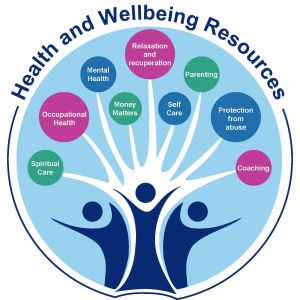Mental Health
 Mental health includes our emotional and psychological wellbeing.
Mental health includes our emotional and psychological wellbeing.
It affects how we think, feel, and act. It also helps determine how we handle stress, relate to others, and make choices.
Mental health is important at every stage of life, from childhood and adolescence through adulthood.
The following resources, links and services can be accessed to support your mental health.
Mental Health First Aiders
Our Mental Health First Aiders (MHFAs) are a point of contact for staff who may feel stressed, overwhelmed or have other mental health issues.
NHS Golden Jubilee is committed to assist all staff who may be experiencing mental health issues, however big or small, and providing the right support and advice whenever it is needed.
The aims of the MHFA role are:
- To promote recovery of good mental health by signposting and obtaining professional support
- To prevent a condition from developing into a more serious problem
- To preserve life with a person who could be a danger to themselves or others
Other MHFA responsibilities include:
- To maintain confidentiality and provide an ongoing supportive working environment
- To signpost and encourage appropriate professional support
- To reduce the stigma attached to mental health and promote awareness
- To assess the risk of self-harm and suicide
- To summon the appropriate emergency services if necessary
MHFAs learn a range of skills and knowledge they can use to help colleagues when faced with challenging times, whether it be at work at home or work, social, financial or physical difficulties that affect your mental health.
Learning outcomes and skills:
- To know what mental health is, why people develop mental health conditions and the role of a First Aider for mental health
- To know how to provide advice and practical support for a person presenting a suspected mental health condition
- To know how to recognise and manage stress
- To understand the impact of substance abuse on mental health
- To understand the First Aid action plan for mental health and be able to put it into place
- To know how to implement a positive mental health culture in the workplace
- To understand a range of mental health disorders and the support or therapy provided by professional healthcare providers
For more information on Mental Health First Aiders, contact Sharon Docherty.
Mental Health First Aider list
2 West
Bridget MacKinnon
3 West
Mary Williamson; Jackie Dunn
AMP
Linda Nesbitt
Catering
Catherine McKechnie; Pamela Mailler; Elaine Gallagher; Peter Ralston; Morag McMillan; Anne McGregor
Cardiology
Soraya Ibrahim
Corporate Governance/Administration
Nikki Hamer; Laura Morrison
Critical Care
Susan Montgomery
CSPD
Steven McCabe
Finance
Loraine Lester
Health and Safety
Joanne Sadler
Hospital at Night
Jason Mooneesawmy
Hotel
Kirsten Burke; Iain Ramsay; Emma Finlayson
Housekeeping
Lynne Moffat
HR
Lynne Rapson; David Wilson; Natalie Adam; Nicole Cunningham
Medical Records
Johanna Bryson
Medical Secretaries
Carrie Mochan; Natalie Moffat; Pauline McFarlane; Clare Campbell
NES
Caroline Handley
Occupational Health
Amanda Johnston
Ophthalmology
Jennifer MacDonald; Connie Kinnear; Ann Burns; Ailsa McQueen
Quality, Performance, Planning and Programmes
Rikki Young; Carole Anderson; Nicole Sweeney; Lilian Russell
Pharmacy
Linsey Watt
Procurement
Angela Smith
Radiology
Patsy Trainor; Karen Main; Julie Morrison; Louise McDade
Rehabilitation
Jamie McNaught; Christina MacLean; Rachel Connolly
Research
Edward Brockett; Angela McGlade; Mary McAuley; Catherine Sinclair; Roisin Houston; Swati Chopra
Sonographers
Claire Telfer; Kirstine Brown
Theatres
Hazel Colquhoun; Helen McNeish; Jane Gaffney; Marita Oliphant; Laura Scanlon; Alan Chalmers; Jane Rodman; Bissy Varghese
Theatre Stores
Sainabou Nije
Others
Gail McLay; Shona Paterson; John Brodie; Sylvia McCulloch; John Kavitha; Emily Drain; Sarah Jane Groves; Arlene McQueen.
Psychological First Aid
Workforce Specialist Service
The Workforce Specialist Service (WSS), is a confidential, multidisciplinary mental health treatment service with expertise in treating regulated health and social services professionals.
The WSS forms part of a ‘network’ of services and resources that aim to improve the wellbeing and mental health of health and social care staff across Scotland, and will supplement the range of staff support services available at local level.
In summary:
It is a free at the point of delivery, confidential primary care led mental health treatment service, which is available to regulated members of the health and social care workforce in Scotland.
It is of particular benefit to those who find may it difficult to access treatment for mental health due to concerns about receiving a confidential service or the professional implications of seeking support.
It is delivered by a multi-disciplinary team of mental health care providers that can treat professionals suffering from a range of mental health issues such as stress, anxiety, depression or addiction, in particular where these might affect work.
The service will operate under a Memorandum of Understanding (MOU) with each of the relevant regulators in order to provide assurance of confidentiality of those they treat wherever possible whilst ensuring patient/client safety and not undermining the statutory responsibilities of the regulator. (N.B. MOUs are in place with the General Medical Council (GMC), General Dental Council (GDC), Health and Care Professions Council (HCPC), the Scottish Social Services Council (SSSC) and the General Pharmaceutical Council (GPhc). We are hoping to finalise shortly MOUs with the Nursing and Midwifery Council (NMC) and the General Optical Council (GOC)).
This service is complementary to the local Occupational Health Service and local support services and does not remove the statutory responsibility of the NHS Board Responsible Officers and Nurse and Midwifery Directors to ensure there is a culture of support to maintain patient safety.
The service has extensive experience supporting regulated professionals and in supporting them through regulatory and investigation processes.
Staff can access the service by visiting the National Wellbeing Hub: The Workforce Specialist Service (WSS) - PRoMIS | National Wellbeing Hub for those working in Health and Social Care. You can also email prac.health@nhs.net, or call 0300 0303 300.
Contact Occupational Health, or visit the department's Staffnet page for more information.
Links to other health and wellbeing resources for staff
Clear Your Head - Mental health tips, advice and support
Daylight - Smartphone app to help people experiencing symptoms of worry and anxiety
National Wellbeing Hub - Emotional and psychological wellbeing support for individuals and managers
NHS Education for Scotland (NES) - Psychosocial support and wellbeing
NHS Inform - Coronavirus (COVID-19): Your mental wellbeing
NHS Golden Jubilee Health and Wellbeing Resources Directory (Staffnet link) - Signposting to trusted resources and services
Silver Cloud - Stress, sleep problems and resilience programmes (see Staffnet for code)
Sleepio - Fully automated and highly personalised programme using cognitive behavioural techniques to help improve poor sleep
Stress Control - Stress control online class with Dr Jim Whyte



